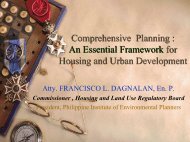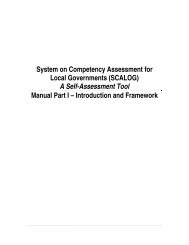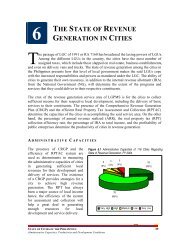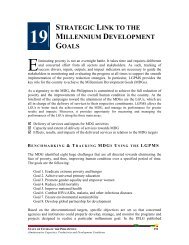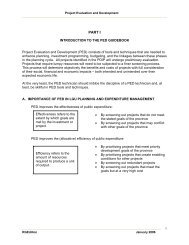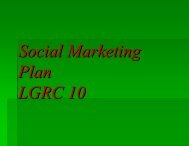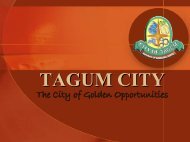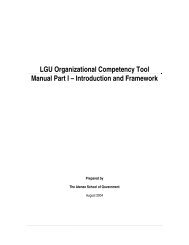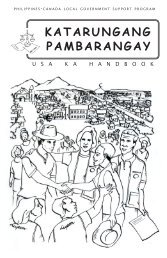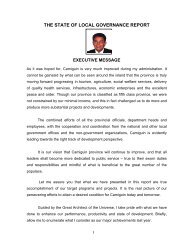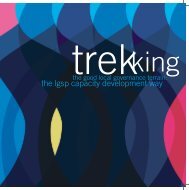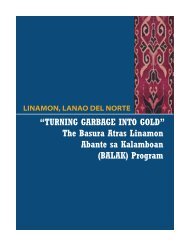Sigma 2005 - LGRC DILG 10
Sigma 2005 - LGRC DILG 10
Sigma 2005 - LGRC DILG 10
You also want an ePaper? Increase the reach of your titles
YUMPU automatically turns print PDFs into web optimized ePapers that Google loves.
Kasama Ka!: Multistakeholder Partnerships for Solid Waste Management<br />
SIGMA, CAPIZ<br />
people aware and supportive of the program. The distribution of advocacy<br />
materials facilitated easy learning and effected broader community<br />
involvement in the program. In fact, ensuring that the 4Es of solid waste<br />
management are included in the program will be a great factor in ensuring<br />
its success.<br />
• The series of capacity building for ESWM strengthened the competencies<br />
of both program implementers and beneficiaries. Learning via Lakbay Aral<br />
and exposure to other LGU’s best practices, for example, inspired<br />
implementers to duplicate and innovate on ESWM best practices.<br />
Technical expertise should also be obtained to help in the engineering<br />
aspects.<br />
• Regular updating and feedbacking helped in checking the relevance of<br />
approaches used.<br />
• Continued resource mobilization/fund sourcing is crucial to ensure<br />
program sustainability. This can be achieved through such efforts as<br />
expanding/strengthening existing partnerships and forging new ones with<br />
partners that can provide much needed resources and institutional<br />
support.<br />
• Institutionalizing the program is also critical. Making sure that the right<br />
legal mandates and policies are in place, including a budget, will help the<br />
program to continue even beyond the terms of the leaders who first<br />
championed it.<br />
At the same time, there were some challenges that <strong>Sigma</strong> encountered which a<br />
replicating LGU may consider:<br />
• Ensuring the proper enforcement of penalties and sanctions for violators<br />
or ESWM ordinances<br />
LGU personnel tasked with this responsibility may be sensitive at first to<br />
people’s persuasions to overlook violations or may be hesitant to enforce<br />
sanctions. Violators may also refuse to pay fines or submit to the<br />
sanctions, which can cause community tensions. It is therefore important<br />
to have the proper implementing rules and regulations in place and clearly<br />
spelled out and that residents are fully consulted and informed of such<br />
rules. The MSWM Board and operations personnel should also monitor the<br />
enforcement of such sanctions and provide guidance on how problems can<br />
be resolved. Incentives should also be put in place to show residents that<br />
compliance is also rewarded.<br />
• Ensuring proper management of the MRFs<br />
This would include proper training and orientation of MRF personnel on<br />
environmental safety and sanitation procedures as well as on equipment<br />
maintenance, solid waste processing, etc. An MRF is a sensitive area;<br />
being a repository of solid waste (recyclables, compost, etc), it must<br />
always be clean and environmentally safe and must not pose any hazard or<br />
inconvenience to the surrounding communities.<br />
October <strong>2005</strong> 16



